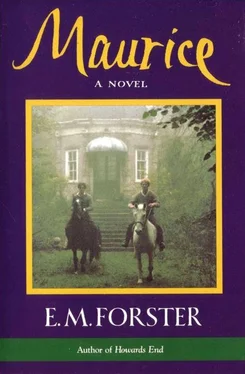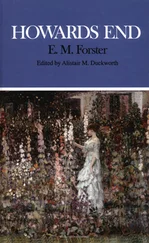4
He was nearly nineteen.
He stood on the platform on Prize Day, reciting a Greek Oration of his own composition. The hall was full of schoolboys and their parents, but Maurice affected to be addressing the Hague Conference, and to be pointing out to it the folly of its ways. "What stupidity is this, O andres Europenaici, to talk of abolishing war? What? Is not Ares the son of Zeus himself? Moreover, war renders you robust by exercising your limbs, not forsooth like those of my opponent." The Greek was vile: Maurice had got the prize on account of the Thought, and barely thus. The examining master had stretched a point in his favour since he was leaving and a respectable chap, and moreover leaving for Cambridge, where prize books on his shelves would help to advertise the school. So he received Grote's History of Greece amid tremendous applause. As he returned to his seat, which was next to his mother, he realized that he had again become popular, and wondered how. The clapping continued — it grew to an ovation; Ada and Kitty were pounding away with scarlet faces on the further side. Some of his friends, also leaving, cried "speech". This was irregular and quelled by the authorities, but the Headmaster himself rose and said a few words. Hall was one of them, and they would never cease to feel him so. The words were just. The school clapped not because Maurice was eminent but because he was average. It could celebrate itself in his image. People ran up to him afterwards saying "jolly good, old man", quite sentimentally, and even "it will be bilge in this hole without you." His relations shared in the triumph. On previous visits he had been hateful to them. "Sorry, mater, but you and the kids will have to walk alone" had been his remark after a football match when they had tried to join on to him in his mud and glory: Ada had cried. Now Ada was chatting quite ably to the Captain of the School, and Kitty was being handed cakes, and his mother was listening to his housemaster's wife, on the disappointments of installing hot air. Everyone and everything had suddenly harmonized. Was this the world?
A few yards off he saw Dr Barry, their neighbour from home, who caught his eye and called out in his alarming way, "Congratulations, Maurice, on your triumph. Overwhelming! I drink to it in this cup" — he drained it — "of extremely nasty tea."
Maurice laughed and went up to him, rather guiltily; for his conscience was bad. Dr Barry had asked him to befriend a little nephew, who had entered the school that term, but he had done nothing — it was not the thing. He wished that he had had more courage now that it was too late and he felt a man.
"And what's the next stage in your triumphal career? Cambridge?"
"So they say."
"So they say, do they? And what do you say?"
"I don't know," said the hero good-temperedly.
"And after Cambridge, what? Stock Exchange?"
"I suppose so — my father's old partner talks of letting me in if all goes well."
"And after you're let in by your father's old partner, what? A pretty wife?"
Maurice laughed again.
"Who will present the expectant world with a Maurice the third? After which old age, grandchildren, and finally the daisies. So that's your notion of a career. Well, it isn't mine."
"What's your notion, Doctor?" called Kitty.
"To help the weak and right the wrong, my dear," he replied, looking across at her.
"I'm sure it is all our notions," said the housemaster's wife, and Mrs Hall agreed.
"Oh no, it's not. It isn't consistently mine, or I should be looking after my Dickie instead of lingering on this scene of splendour."
"Do bring dear Dickie to say how d'ye do to me," asked Mrs Hall. "Is his father down here too?"
"Mother!" Kitty whispered.
"Yes. My brother died last year," said Dr Barry. "The incident slipped your memory. War did not render him robust by exercising his limbs, as Maurice supposes. He got a shell in the stomach."
He left them.
"I think Dr Barry gets cynical," remarked Ada. "I think he's jealous." She was right: Dr Barry, who had been a lady killer in his time, did resent the continuance of young men. Poor Maurice encountered him again. He had been saying goodbye to his housemaster's wife, who was a handsome woman, very civil to the older boys. They shook hands warmly. On turning away he heard Dr Barry's "Well, Maurice; a youth irresistible in love as in war," and caught his cynical glance.
"I don't know what you mean, Dr Barry."
"Oh, you young fellows! Butter wouldn't melt in your mouth these days. Don't know what I mean! Prudish of a petticoat! Be frank, man, be frank. You don't take anyone in. The frank mind's the pure mind. I'm a medical man and an old man and I tell you that. Man that is born of woman must go with woman if the human race is to continue."
Maurice stared after the housemaster's wife, underwent a violent repulsion from her, and blushed crimson: he had remembered Mr Ducie's diagrams. A trouble — nothing as beautiful as a sorrow — rose to the surface of his mind, displayed its ungainliness, and sank. Its precise nature he did not ask himself, for his hour was not yet, but the hint was appalling, and, hero though he was, he longed to be a little boy again, and to stroll half awake for ever by the colourless sea. Dr Barry went on lecturing him, and under the cover of a friendly manner said much that gave pain.
5
He chose a college patronized by his chief school friend Chapman and by other old Sunningtonians, and during his first year managed to experience little in University life that was unfamiliar. He belonged to an Old Boys' Club, and they played games together, tea'd and lunched together, kept up their provincialisms and slang, sat elbow to elbow in hall, and walked arm in arm about the streets. Now and then they got drunk and boasted mysteriously about women, but their outlook remained that of the upper fifth, and some of them kept it through life. There was no feud between them and the other undergraduates, but they were too compact to be popular, too mediocre to lead, and they did not care to risk knowing men who had come from other public schools. All this suited Maurice. He was constitutionally lazy. Though none of his difficulties had been solved, none were added, which is something. The hush continued. He was less troubled by carnal thoughts. He stood still in the darkness instead of groping about in it, as if this was the end for which body and soul had been so painfully prepared.
During his second year he underwent a change. He had moved into college and it began to digest him. His days he might spend as before, but when the gates closed on him at night a new process began. Even as a freshman he made the important discovery that grown-up men behave politely to one another unless there is a reason for the contrary. Some third-year people had called on him in his digs. He had expected them to break his plates and insult the photograph of his mother, and when they did not he ceased planning how some day he should break theirs, thus saving time. And the manners of the dons were even more remarkable. Maurice was only waiting for such an atmosphere himself to soften. He did not enjoy being cruel and rude. It was against his nature. But it was necessary at school, or he might have gone under, and he had supposed it would have been even more necessary on the larger battlefield of the University.
Once inside college, his discoveries multiplied. People turned out to be alive. Hitherto he had supposed that they were what he pretended to be — flat pieces of cardboard stamped with a conventional design — but as he strolled about the courts at night and saw through the windows some men singing and others arguing and others at their books, there came by no process of reason a conviction that they were human beings with feelings akin to his own. He had never lived frankly since Mr Abrahams's school, and despite Dr Barry did not mean to begin; but he saw that while deceiving others he had been deceived, and mistaken them for the empty creatures he wanted them to think he was. No, they too had insides. "But, O Lord, not such an inside as mine." As soon as he thought about other people as real, Maurice became modest and conscious of sin: in all creation there could be no one as vile as himself: no wonder he pretended to be a piece of cardboard; if known as he was, he would be hounded out of the world. God, being altogether too large an order, did not worry him: he could not conceive of any censure being more terrific than, say, Joey Fetherstonhaugh's, who kept in the rooms below, or of any Hell as bitter as Coventry.
Читать дальше












